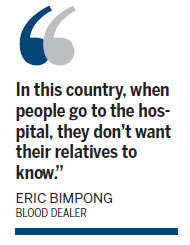Ghana's youth turn to selling their blood
Private traders fill need in nation where plasma is in short supply
To Ghana's legions of jobless young men, Eric Bimpong has a moneymaking proposition: Sell your blood.
Bimpong spends his days outside schools, bars and on the streets of poor neighborhoods in Accra, searching for teenagers and 20-somethings to give blood outside the capital's largest hospital.
Commercial blood donors, as the authorities call them, fill a void in a country where blood is often in short supply and where cultural and religious beliefs keep some from donating.
"In this country, when people go to the hospital, they don't want their relatives to know," to hide certain illnesses, Bimpong said. "So they come to us."
While their donations likely save the lives of bleeding patients, public health officials worry that the donors spread diseases like HIV or hepatitis to those who receive their blood.
"It's abnormal. We don't really encourage this kind of donation," said Stephen Addai, a spokesman for Ghana's National Blood Service.
"Sometimes they don't even know their blood group."
Fear of needles
Ghana has prospered in recent years off exports of gold, cocoa and oil as well as the country's reputation for stability in tumultuous West Africa.
While its economy has recently begun slowing down, Ghana's government is investing heavily in building new hospitals and renewing old facilities.
But keeping blood banks stocked remains a constant struggle, Addai said.
The NBS usually relies on students to donate the approximately 250 units per day of blood used in the southern third of the country, which includes the capital.
But they still run short, particularly when students go on vacation, Addai said.
The NBS has sounded the alarm about blood shortages repeatedly on radio stations and in newspapers, encouraging people to come out and donate.
During a recent blood donor drive at a shopping mall in Accra, the NBS hoped to get 1,500 donors, Addai said. Instead, they got just five.
"They are afraid of the syringe," Addai said.

Blood shortages
Chronic blood shortages have forced hospital blood centers to improvise.
When a patient arrives in need of blood and a hospital has none to offer, nearby clinics are contacted to see if they might have some available, Addai said.
If the clinics don't, family members are called to come and donate. Friends will suffice, too - if they're willing.
If that fails, "it means that the victim will not survive", Addai said.
More than 42 percent of Ghana's unemployed are aged 15 to 24, and just under a quarter of the population of 26 million live below the poverty line of 3.60 cedi ($1.05) per day.
As a result, Bimpong finds a ready supply of volunteers at high schools, drinking spots and in market places.
"I go to places where I can see people are not working," he said.
The going-rate per pint - 0.57 liters - of blood is 100 to 120 cedis. Bimpong keeps 20 cedis for himself.
According to Addai, donated blood is tested for HIV, hepatitis B and C, and syphilis, and donors are asked if they've been sick with malaria.
Despite screening, there have been a number of cases involving contaminated blood in other parts of the world.
From the 1970s onward, more than half a dozen countries, including Britain, France, Italy and Japan, were hit by scandals over tainted blood for transfusion. The biggest scare was over contamination by the AIDS virus.
(China Daily 09/22/2014 page10)














